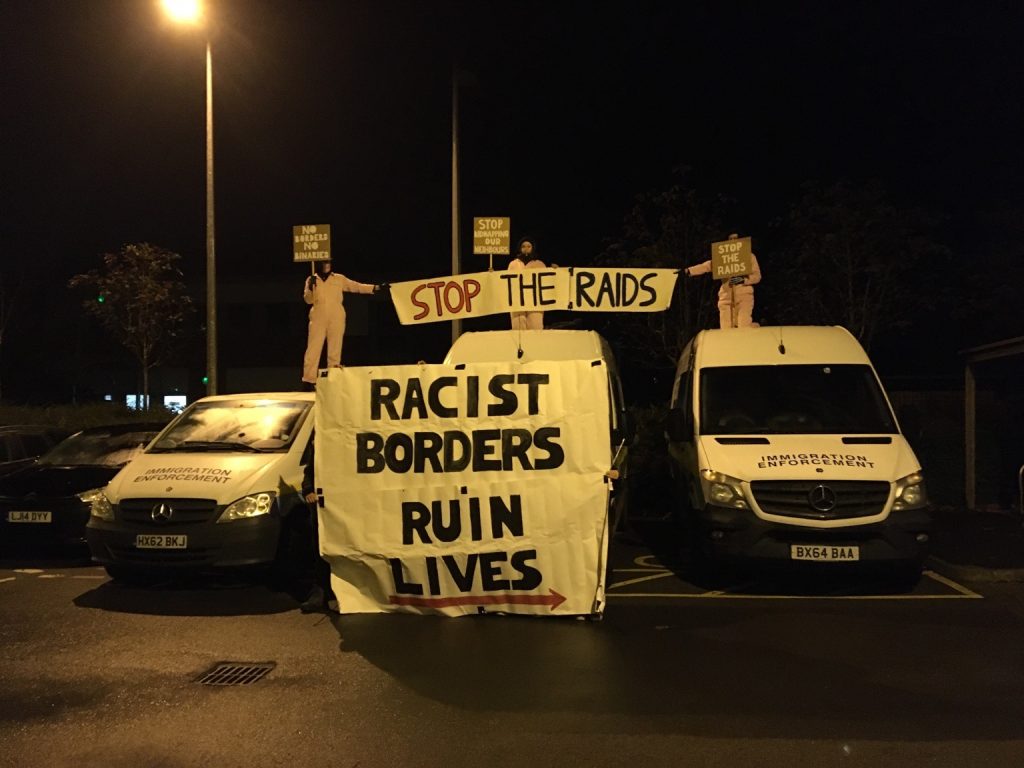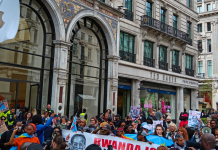As the climate emergency is forcing ever-greater numbers of people to migrate, Ida Picard analyses the function that borders play in extinction capitalism and argues that we must be uncompromising in calling for all borders to go.
This talk was originally given at rs21’s Endgames conference. A report is available here.
It is extremely welcome that climate change has moved so far up the agenda and is now being discussed outside of the circles traditionally concerned with it. However, climate change and its crises need to be seen in connection with other elements of capitalist crisis, such as imperialism, austerity and the border regime, to name just a few.
Capitalism is crisis
In order to bring these other aspects into focus it is useful to begin by examining on a general level certain aspects of capitalist production. The capitalist mode of production is dependent on continuously escalating the extraction of natural resources, thereby necessitating the non-stop rise of greenhouse gas emissions, pollution and environmental degradation.
Realistically, without ending capitalism, we have no chance of halting or reversing the complete breakdown of the world’s ecosystems. Within our current economic order major petroleum companies are able to manipulate and to a large extent control state policies and act as stakeholders in international agreements, avoiding liability for damage done to people living near pipelines and other oil facilities.
All the big petroleum companies have entire departments dedicated to lobbying states. In addition, states in capitalism are locked in to the pursuit of the maximisation of national economic growth. And so, within this one example, we can see how the reciprocal dependence between fossil capital and the state locks in a logic of climate breakdown.
As Brian Parkin has put it in an article previously published on this site:
It is both an irony and a paradox that [within capitalism] we have developed the scientific means of understanding both the causes and possible means of reducing climate change, whilst being locked into a mode of production for which the appetite for petroleum remains insatiable.
Meanwhile, the numbers of people displaced across the world over continues to grow. The UN is predicting 200 million climate refugees by 2050, or as they call it ‘persons displaced in the context of disasters and climate change’.
However, when we talk about climate refugees we should not think just about people having to relocate due to floods, droughts or other extreme climate phenomena. We must go further and include among climate refugees people moving due to conflict over resources, food insecurity, imperialist wars and economic migration in the wake of whole areas of the world being rapidly made uninhabitable.
It is becoming increasingly evident that more and more people will be forced to flee circumstances which make life unsustainable, whilst there exists a relationship between capital and the state system which guarantees the increasingly intense exploitation of human labour power and degradation of the world’s resources.
Extractivism and border regimes
In this context – the role of the state as a ‘container’ of the crisis facing us starts to become clear. While the pressure builds and breakdown looms, Western states including Britain are fortifying their borders, as border controls creep ever deeper into all strata of our societies.
Borders perform a crucial function: border regimes ensure that the crisis appears ‘contained’ through the regimentation and control of citizenship and the movement of people.
At the same time, borders represent an attempt to maintain the global division of labour through creating areas of the world where social reproduction is significantly cheaper, that is, where the wages and the maintenance costs of the labour force are lower, and where workers are unable to travel between areas of the world to seek better pay and conditions.
This division of labour structures the world in such a way that entire sections of the economy are particularly specialised. Extractive industries, such as oil drilling or coal mining, destroy the capacity to produce in any other way, by polluting the soil, destroying the conditions of production, or simply driving out competing forms of capital. These same regions are also dependent on certain markets, which make up the ‘other side’ of this division of labour.
For example, highly intensive mineral mining in Africa depends on and supports global supply chains for phones made in China and then sold in Europe. This means that entire areas of the world have become less and less able to provide for the varied needs of populations who live there.

Borders reinforce this division by regulating the flow of commodities between these different poles and tying people to particular areas of the world. We also see that extractive industries often provide the majority of the funding for those same militias who police the borders and control the supplies of resources, in part because they tend to deliver higher rates of profit than other forms of production, and are oriented around simple labour processes which are easy to control and securitise.
In Sudan, for instance, the Janjaweed militia get most of their revenue from the Sudanese oil fields, but also from the European Union, which pays them to violently enforce its borders and stop desperate people trying to reach crossing points into Europe.
This interdependence of extractive industry, borders and the repressive state machine is highly significant. For decades, people have been fleeing the wars in the Middle East waged over one of the world’s petroleum hubs, or moving away from areas of the world made uninhabitable or unable to support its population by extractive capital.
Internal borders
The border also creates and reinforces a division of labour within Britain. The border regime determines which people have the ‘right’ to work, or to claim benefits, or even to reside in the country. In reality, under capitalism, no-one can live without a wage, and so many migrants are forced to accept illegal contracts paying less than minimum wage, or are frightened into not demanding better pay and conditions by the threat of deportation and criminalisation.
However, even sections of the left still fail to show the basic political solidarity needed against the border and against these racist divisions. The border is, in many ways, a microcosm of the global division of labour, which structures the capitalist mode of production that is destroying the planet. The border regime even mirrors many of the practices of colonial control, previously tested on colonised peoples, such as surveillance methods, violent repression, detention without trial and accusations of subversion.
The solidification of the border regimes in the UK, Europe and the US cannot be analysed without recognising that the borders imposed on the world through colonialism and imperialism are arbitrary and unstable, and that the global ravages of capitalism – in the form of imperialism – is creating conditions from which people will necessarily need to move.
Fighting the state on the territory of our borders, calling for an end to borders altogether, has long been seen as an extremely radical demand – maybe more polemical than real. But with the climate breakdown this is no longer so.
‘Overpopulation’
Often, however – conversations about climate change centre not on the ravages of capital, but instead the supposed ravages of people. This can be demonstrated with reference to two different, but related, examples. The first is ‘overpopulation’ – a bogeyman for the climate crisis which is shared across the political spectrum, from mass-murdering fascists to David Attenborough.

This idea that it is ‘people’ exhausting the world’s resources, and that these resources can never grow at the same rate as the human population, is not a new argument. Thomas Malthus (1766-1834) called for population control for poor people, whose ‘overpopulation’, he claimed, led to a host of societal ills.
The same arguments are used today, primarily against ‘populations’ in the Global South: climate change is caused by ‘too many people’ and in particular, the ‘too many people’ who live outside the West. Marx himself addressed this argument several times – particularly as it relates to Ireland. In volume one of Capital (1867) he wrote:
As appetite grows with eating, English rentiers and capitalists will continue to discover that Ireland with three and a half million people, still continues to be miserable, miserable because she is overpopulated. Therefore Ireland’s depopulation must go still further, in order that she may fulfil her true destiny: to be a sheep walk and cattle pasture for English capitalists!
Ireland was not overpopulated – neither is the global south overpopulated today. Capital is, however, over-extracting and overproducing. In the same way that English capitalists restructured the Irish economy to gear it towards the wool trade and meat production, large parts of the world are made uninhabitable through organising local economies for the production of commodities for export on the world market rather than for the reproduction of the population.
Put more specifically, areas of the world are only overpopulated insofar as their whole ecosystems become organised to produce certain commodities for international markets.
These global markets are what cause people to have to move. When capital is ‘booming’ there is huge demand for labour, when it is bust those populations are no longer required. This explains, in part, the change in attitude in Western Europe towards migration in the last 50 years. In the post-war period European markets demanded more labourers. European states were happy to bring labourers in from the colonies, at worse pay and in poorer conditions than the native population.
Of course, now, in the context of climate breakdown and imperialist warfare, the situation is different. In the same way the Malthusians argued that it is people draining the natural resources of the world, people in the West are describing those who migrate here as draining the resources of our nation states or national economies. The broader point here is that we cannot talk in abstract terms about overpopulation: economic conditions always underpin state responses to migration.
Voices within the environmental movement use these arguments too. For example, Rupert Read, who recently went on Question Time as a spokesperson for Extinction Rebellion has written that ‘mass migration’ reduces social cohesion. He argues that it makes the development of ‘the increasingly collaborative, progressive economy we need to become greener’ impossible, and he has argued against moving people from areas where they would have a low environmental footprint to high impact areas like the West.
This is thinly veiled racism, the belief that some people simply belong in poorer and more exploited parts of the world. It is also part of what fuels a growing number of eco-fascists. It relies on an essentialist, racist view of environmentalism, which views environmental politics as being about retreating back to our ‘original’ homelands and living separated by race.
Climate justice is migrant justice
While many on the left have been unacceptably slow at accepting that responding to climate change must be a key part of our internationalism and international solidarity as socialists and anti-capitalists, there are some very positive examples too.
A few weeks ago, an environmental group named Bristol Rising Tide occupied part of the Home Office’s depot in Portishead with Reclaim the Power, stopping Immigration Enforcement vans for leaving. Similarly, the Stansted 15 action, where activists blocked a deportation plane from taking off, was organised in large part by individuals who had learnt the techniques of airport protest from (and within) the climate movement. During the school strike in September, migrant solidarity groups including Lesbians and Gays Support the Migrants organised a bloc, using the slogan ‘climate justice is migrant justice’.

While, for now, we are not feeling the sharpest edge of climate change in this country and are in some ways separated from those who are, those of us who consider ourselves to be anti-capitalist must recognise that climate change, as with capitalism itself, binds together each place, each person, and each contradiction.
This worldwide ecological breakdown – and the ravages of imperialism, of transnational petro-capital, of increasingly militarised border regimes across the world – cannot be addressed by disorganised legalistic proposals. The Paris Accord, the Supreme Court, and even the Labour Party will not save us from climate breakdown, because they are embedded in the logic of the same system that drives exploitation and imperialism. For the same reason they will certainly not save those forced to migrate through imperialist wars, breakdown of ecological systems or deepening poverty.
This is not an argument for abandoning our responsibility for fighting our own states – we must struggle for a breaking down of the border regime.
But it should come as no surprise to socialists and communists that the world is facing a breaking point: we have always known that capitalism leads to constant crisis, misery and war.
For so many across the world, the catastrophe is already here, it has already been going on for much longer than climate change has been on the agenda in the Western world. Climate change is simply demonstrating that it is completely untenable to continue to organise the world this way.



















[…] need to get this right. This debate is only going to get more important as the climate crisis forces more people to migrate as a result of droughts, famines, floods, fires and […]